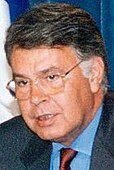
The Spanish Socialist Workers' Party is a social-democratic political party in Spain. The PSOE has been in government longer than any other political party in modern democratic Spain: from 1982 to 1996 under Felipe González, 2004 to 2011 under José Luis Rodríguez Zapatero, and since 2018 under Pedro Sánchez.

The 1989 Spanish general election was held on Sunday, 29 October 1989, to elect the 4th Cortes Generales of the Kingdom of Spain. All 350 seats in the Congress of Deputies were up for election, as well as 208 of 254 seats in the Senate. An election had not been due until 28 July 1990 at latest, but Prime Minister Felipe González called for a snap election nine months ahead of schedule, allegedly on the need of implementing tough economic measures. González hoped to capitalize on a still strong economy and his party's electoral success in a European Parliament election held in June, after a troubled legislature which had seen an increase of social protest on his government's economic policy and the calling of a massive general strike in 1988.

The 1986 Spanish general election was held on Sunday, 22 June 1986, to elect the 3rd Cortes Generales of the Kingdom of Spain. All 350 seats in the Congress of Deputies were up for election, as well as 208 of 254 seats in the Senate.

The Leader of the Opposition is an unofficial, mostly conventional and honorary title frequently held by the leader of the largest party in the Congress of Deputies—the lower house of the Spanish parliament, the Cortes Generales—not within the government. They are usually the person who is expected to lead that party into the next general election.

The 1987 European Parliament election in Spain was held on Wednesday, 10 June 1987, to elect the MEP delegation from the country for the 2nd European Parliament. All 60 seats allocated to Spain as per the 1985 Treaty of Accession were up for election. The election was held simultaneously with regional elections in thirteen autonomous communities and local elections all throughout Spain.

The 1989 European Parliament election in Spain was held on Thursday, 15 June 1989, as part of the EU-wide election to elect the 3rd European Parliament. All 60 seats allocated to Spain as per the 1985 Treaty of Accession were up for election.
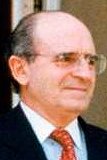
The 1994 European Parliament election in Spain was held on Sunday, 12 June 1994, as part of the EU-wide election to elect the 4th European Parliament. All 64 seats allocated to Spain as per the 1993 Council Decision amending the Direct Elections Act were up for election. The election was held simultaneously with a regional election in Andalusia.

Jerónimo Saavedra Acevedo was a Spanish politician and academic. He served as President of the Canary Islands twice, from 1983 to 1987, and again from 1991 to 1993.

The 38th Federal Congress of the Spanish Socialist Workers' Party was held in Seville from 3 to 5 February 2012, to renovate the governing bodies of the Spanish Socialist Workers' Party (PSOE) and establish the party's main lines of action and strategy for the next leadership term. The congress was called after the PSOE suffered its worst defeat since the Spanish transition to democracy in the general election held on 20 November 2011. Previous secretary-general José Luis Rodríguez Zapatero had announced in April the same year he would not stand for election to a third term as Prime Minister of Spain, announcing his intention to step down as party leader after a successor had been elected.

The 35th Federal Congress of the Spanish Socialist Workers' Party was held in Madrid from 21 to 23 July 2000 to renovate the governing bodies of the Spanish Socialist Workers' Party (PSOE) and establish the party's main lines of action and strategy for the next leadership term. It was held after the party's defeat in the 2000 general election and the subsequent resignation of then secretary-general Joaquín Almunia.

The 2014 Extraordinary Federal Congress of the Spanish Socialist Workers' Party was held in Madrid from 26 to 27 July 2014, to renovate the governing bodies of the Spanish Socialist Workers' Party (PSOE) and establish the party's main lines of action and strategy for the next leadership term. A primary election to elect the new party secretary-general was held on 13 July. The congress was called by outgoing PSOE leader Alfredo Pérez Rubalcaba after his party's poor results at the 2014 European Parliament election, garnering just 23% of the vote. Rubalcaba announced his intention not to run for either his party's leadership or for the 2015 Spanish general election.
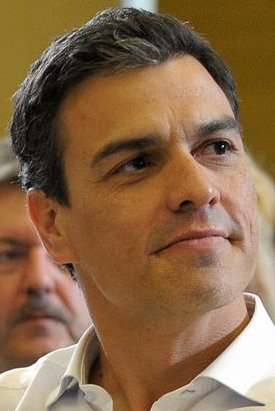
The 2016 PSOE crisis was a political conflict within the Spanish Socialist Workers' Party (PSOE), starting on 26 September 2016. Long-standing discontent with party Secretary-General Pedro Sánchez and the combination of a series of circumstances resulted in a party revolt to force Sánchez's dismissal on 28 September, in an episode lasting until 1 October colloquially dubbed by some media and journalists as the "war of the roses". The ensuing power vacuum and Sánchez's replacement by an interim managing committee, coupled with the party's turn to allow a People's Party (PP) minority government after a 10-month deadlock on government formation and the resulting worsening of relations with its sister party in Catalonia, the Socialists' Party of Catalonia (PSC), triggered a crisis of a scale unprecedented in the party's 137 years of existence.

The 39th Federal Congress of the Spanish Socialist Workers' Party was held in Madrid between 16 and 18 June 2017, to elect a new party leadership in the Spanish Socialist Workers' Party (PSOE) and set out the party's main lines of action and strategy, after the sacking of Pedro Sánchez as party leader in October 2016 had resulted in a caretaker leadership being appointed. The primary election was held on 21 May 2017, after being confirmed in a federal committee on 1 April.

The 18th National Congress of the People's Party was held in Madrid from 10 to 12 February 2017, to renovate the governing bodies of the People's Party (PP) and establish the party's main lines of action and strategy for the next leadership term. The congress was initially due for 2015, but the various elections held in Spain that year and the deadlock in the government formation negotiations leading up to the 2016 general election, as well as a major crisis over the issue within the opposition Spanish Socialist Workers' Party (PSOE), saw the event being delayed until early 2017.

Meritxell Batet Lamaña is a Spanish jurist, politician, and member of the Socialists' Party of Catalonia (PSC), who served as President of the Congress of Deputies from 2019 to 2023. Prior to this, she served as Minister for Territorial Policy and Civil Service of the Government of Spain between June 2018 and May 2019.

The third government of Felipe González was formed on 7 December 1989, following the latter's election as Prime Minister of Spain by the Congress of Deputies on 5 December and his swearing-in on 6 December, as a result of the Spanish Socialist Workers' Party (PSOE) emerging as the largest parliamentary force at the 1989 Spanish general election. It succeeded the second González government and was the Government of Spain from 7 December 1989 to 14 July 1993, a total of 1,315 days, or 3 years, 7 months and 7 days.

The fourth government of Felipe González was formed on 14 July 1993, following the latter's election as Prime Minister of Spain by the Congress of Deputies on 9 July and his swearing-in on 13 July, as a result of the Spanish Socialist Workers' Party (PSOE) emerging as the largest parliamentary force at the 1993 Spanish general election. It succeeded the third González government and was the Government of Spain from 14 July 1993 to 6 May 1996, a total of 1,027 days, or 2 years, 9 months and 22 days.
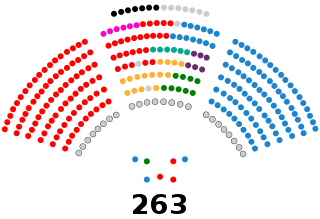
The 14th Cortes Generales was a meeting of the Cortes Generales, the national legislature of Spain, with the membership determined primarily by the results of the general election held on 10 November 2019. The Cortes met for the first time on 3 December 2019, and was dissolved prematurely on 29 May 2023 after regional and local elections in which the governing PSOE lost control of six autonomous communities and many local councils.

A motion of no confidence in the Spanish government of Felipe González was debated and voted in the Congress of Deputies between 26 and 30 March 1987. It was proposed by People's Alliance (AP) leader Antonio Hernández Mancha, motivated on the "deteriorating situation of the country" as a result of the social conflict sparked throughout the 1986–87 winter between the governing Spanish Socialist Workers' Party (PSOE) and its erstwhile allied Workers' General Union (UGT), which had grown increasingly critical of González's economic policies. However, the motion's true motives were attributed to Mancha's need for public promotion as both AP and opposition leader after his recent election to the post, as well as to his party's perceived urge to vindicate its primacy within the centre-right political spectrum in Spain amid the internal crisis that had been beleaguering it in the previous months.
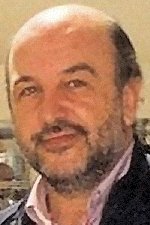
The 34th Federal Congress of the Spanish Socialist Workers' Party was held in Madrid from 20 to 22 June 1997, to renovate the governing bodies of the Spanish Socialist Workers' Party (PSOE) and establish the party's main lines of action and strategy for the next leadership term. It saw Joaquín Almunia being elected unopposed as party secretary-general, with 74.7% of the delegate vote in the congress and 25.3% of blank ballots (231), following Felipe González's surprise announce in the congress opening that he would not be seeking re-election as party leader.
